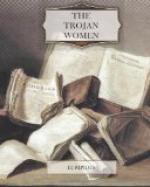And harbour for a woman storm-driven:
A woman borne away by violent men:
And this one birthright of my beauty, this
That might have been my glory, lo, it is
A stamp that God hath burned, of slavery!
Alas! and if thou cravest still to be
As one set above gods, inviolate,
’Tis but a fruitless longing holds thee yet.
LEADER.
O Queen, think of thy children and thy land,
And break her spell! The sweet soft speech, the
hand
And heart so fell: it maketh me afraid.
HECUBA.
Meseems her goddesses first cry mine aid
Against these lying lips!... Not Hera, nay,
Nor virgin Pallas deem I such low clay,
To barter their own folk, Argos and brave
Athens, to be trod down, the Phrygian’s slave,
All for vain glory and a shepherd’s prize
On Ida! Wherefore should great Hera’s eyes
So hunger to be fair? She doth not use
To seek for other loves, being wed with Zeus.
And maiden Pallas ... did some strange god’s
face
Beguile her, that she craved for loveliness,
Who chose from God one virgin gift above
All gifts, and fleeth from the lips of love?
Ah, deck not out thine own heart’s
evil springs
By making spirits of heaven as brutish things
And cruel. The wise may hear thee, and guess
all!
And Cypris must take ship-fantastical!
Sail with my son and enter at the gate
To seek thee! Had she willed it, she had sate
At peace in heaven, and wafted thee, and all
Amyclae with thee, under Ilion’s wall.
My son was passing beautiful, beyond
His peers; and thine own heart, that saw and conned
His face, became a spirit enchanting thee.
For all wild things that in mortality
Have being, are Aphrodite; and the name
She bears in heaven is born and writ of them.
Thou sawest him in gold and orient vest
Shining, and lo, a fire about thy breast
Leapt! Thou hadst fed upon such little things,
Pacing thy ways in Argos. But now wings
Were come! Once free from Sparta, and there rolled
The Ilian glory, like broad streams of gold,
To steep thine arms and splash the towers! How
small,
How cold that day was Menelaus’ hall!
Enough of that. It was by force my
son
Took thee, thou sayst, and striving.... Yet not
one
In Sparta knew! No cry, no sudden prayer
Rang from thy rooms that night.... Castor was
there
To hear thee, and his brother: both true men,
Not yet among the stars! And after, when
Thou camest here to Troy, and in thy track
Argos and all its anguish and the rack
Of war—Ah God!—perchance men
told thee ’Now
The Greek prevails in battle’: then wouldst
thou
Praise Menelaus, that my son might smart,
Striving with that old image in a heart
Uncertain still. Then Troy had victories:
And this Greek was as naught! Alway thine eyes




